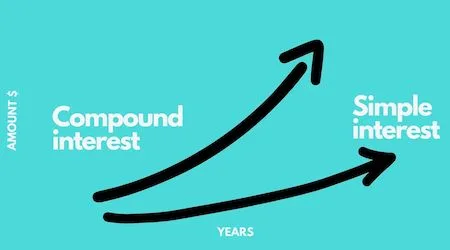Key takeaways
- Compound interest means you earn interest on your initial savings balance and any interest you've already accumulated.
- Compound interest makes your savings grow much quicker than simple interest.
- Most savings accounts offer compound interest, which is calculated daily and paid monthly.
Compare compound interest savings accounts
Compare other products
We currently don't have that product, but here are others to consider:
How we picked theseHow the Finder Score helps you find a better savings account
The Finder Score is a simple score out of 10. The higher a savings account's score, the better we think it is for the average customer.
We score each savings account in our database of hundreds based on a data-driven methodology with 2 main criteria: Does the account offer a high interest rate? And is it easy for savers to actually earn that rate?

"Compounding is like a magic trick that makes your money grow faster, or your debt grow bigger. Either way, it means that small, consistent efforts – even as little as paying $20 extra into your mortgage, super or savings each week – can make a big impact down the track."
How does compound interest work?
The best way to explain how compound interest works is with an example using Finder's compound interest calculator:
- Let's say you invest $20,000 in an account with an interest rate of 5.50% p.a. compounded for 5 years.
- The initial investment of $20,000 earns $1,128.16 in the first year, giving you a total of $21,128.16.
- The following year, you still earn the same rate of 5.50% p.a. – but this time it's applied to $21,128.16.
- This will make your balance $22,319.95 after the second year, even though you haven't deposited any extra money into the account yourself.
- This amount ($22,319.95) is the base for compounding for the third year, and so on. After 5 years, you'll have $26,314.08.
The longer your timeline ahead of you, the more your balance grows. In our fictional example, after 10 years, you'd have $34,621.53 and after 20 years, $59,932.51. This is without ever adding an extra cent of your own money.
To get the most benefit out of compound interest, deposit as much as you can into your account and restrict the number of withdrawals you make. The more money that is in your account at the end of the month, the more interest you will earn.
Want to see how much you could earn?
Use our compound interest calculator
How can compound interest help you grow your savings?
 Compound interest can turn a small amount of money today into a large amount of money over the space of 10, 20 or 30 years.
Compound interest can turn a small amount of money today into a large amount of money over the space of 10, 20 or 30 years.
The longer your timeline ahead of you, the more you stand to benefit from compound interest.
How do banks calculate compound interest?
Interest is typically calculated on the daily closing balance. Here's the savings account equation:
- Daily closing balance x interest rate (as a percentage) / 365
Interest begins to accumulate on the day the opening deposit is made in your savings account. It's then usually credited into your account on the last day of each month. If you choose to close your account, your accrued interest will be deposited on the day it's closed.
Any interest awarded to your savings account is usually available for use on the same day it's been credited. The daily closing balance of your savings account tends to include all cleared and uncleared transactions. This may be because electronic transfers to your linked bank account usually occur on a business day.

"I would almost always put money into a savings account over a term deposit. Savings accounts earn compound interest (meaning you earn interest on the interest paid), whereas most term deposits only earn simple interest (meaning you earn interest only on the initial deposit)."
How do you find the monthly interest rate?
The monthly variable interest rate will be clearly displayed on the provider's website under the product description for the particular account you’re looking at. Instead of going to each bank's website, you can take a look at the latest high interest savings account interest rates in our guide. It is important to remember that the interest rate is variable, meaning it will change from time to time.
Frequently asked questions
Sources
Ask a question
4 Responses
More guides on Finder
-
Savings accounts with no conditions
These savings accounts let you earn a decent ongoing interest rate on your cash with no annoying hoops to jump through.
-
Bendigo Bank Reward Saver Account
Read Finder's review of the Bendigo Bank Reward Saver. Learn how you can earn the maximum bonus interest rate with this account.
-
ME HomeME Savings Account
You can earn a really impressive ongoing bonus rate of 4.6% p.a., however you need to deposit $2,000 per month.
-
Bankwest Easy Saver account
The Bankwest Easy Saver account offers a bonus rate for the first 4 months, then an ongoing standard variable rate with no conditions to meet.
-
Bank of Queensland Simple Saver Account
Check out out review of the Bank of Queensland Simple Saver Account.
-
Australian interest rate history
See historical interest rates for savings accounts since January 2012.
-
High interest savings accounts Australia
Kickstart your savings plan with a high interest savings account.
-
Best savings accounts Australia
See some of the best savings accounts in Australia right now with high interest rates and no fees, plus tips to help you find the best savings account for you.
-
ING Savings Maximiser
The ING Savings Maximiser is a high interest savings account with a competitive interest rate when you meet the account conditions. Here's how to earn the top bonus rate with this account.
-
Savings interest calculator
Our range of simple calculators can help you plan your finances and compare potential interest earned.


If I want to start saving and am already 49years old with no initial amount deposit and can save $100/week for the next 10 years would a savings account via a bank that compound interest be the best way to go?
Hi Lisa,
We can’t really tell you what the “best” option for you is, as this depends on so many factors. If you are looking for a low risk way to slowly grow your savings, a high interest savings account could work well for you.
10 years is a long time frame, which is good for compound interest. But it also depends on how interest rates move over time, which is hard to predict. Rates for high interest savings accounts have been around 5% lately, but they may be lower in the future.
You have other options to build wealth, such is investing in ETFs (a riskier option with higher growth potential) and also putting more money into your super. This has tax benefits but does have some short term risk because the money is invested and can go up or down, but should still grow over time.
Hi there
just wanted to get more information about compound interest. what is my best option of opening account with any financial institution that offeres compound interest.
Thanks in advance
Compound interest will apply to any account where you leave the money in place and don’t make withdrawals. Check out our guide to high interest savings accounts for options to consider.